After surviving a major health scare, these survivors are paying it forward
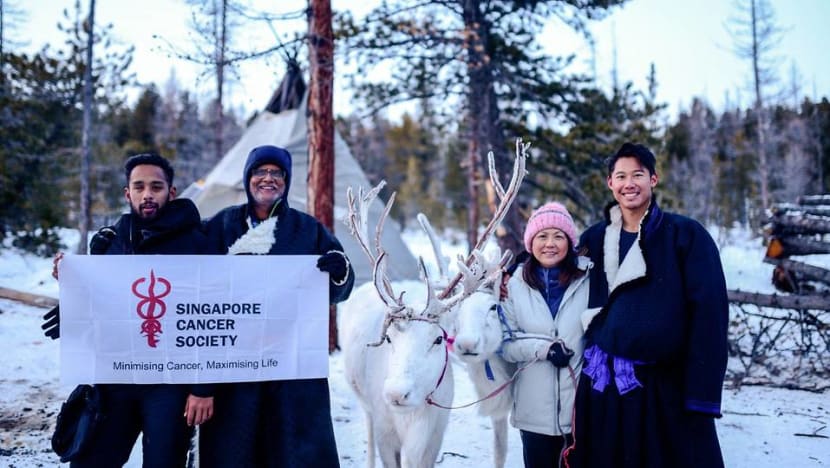
Amal Luqman (leftmost) and Ellil Mathiyan (second from left) trekked in Northern Mongolia last December in subzero temperatures to raise funds for the Singapore Cancer Society. (Photo: Chung Yong Xi).
SINGAPORE: Ellil Mathiyan and Amal Luqman are 30 years apart in age, but they share two things in common: A love for singing along to songs by Michael Jackson, the Bee Gees and Phil Collins.
And cancer.
Mr Mathiyan and Mr Luqman were the only two cancer survivors on a trekking trip last December to Northern Mongolia to raise funds for the Singapore Cancer Society. Mr Mathiyan, 60, was diagnosed with both rectal and testicular cancer in March 2011. Because of an operation to remove the tumor from his rectum, he has to wear a stoma bag on his abdomen to collect waste from his body.
Mr Luqman was hit hard at a much younger age. The 30-year-old found out that he had stage two lymphoma when he was 17 after a doctor noticed a lump on his neck.
Both of them have long been in remission. But memories of the physical pain and loneliness they felt during their treatment have not disappeared.
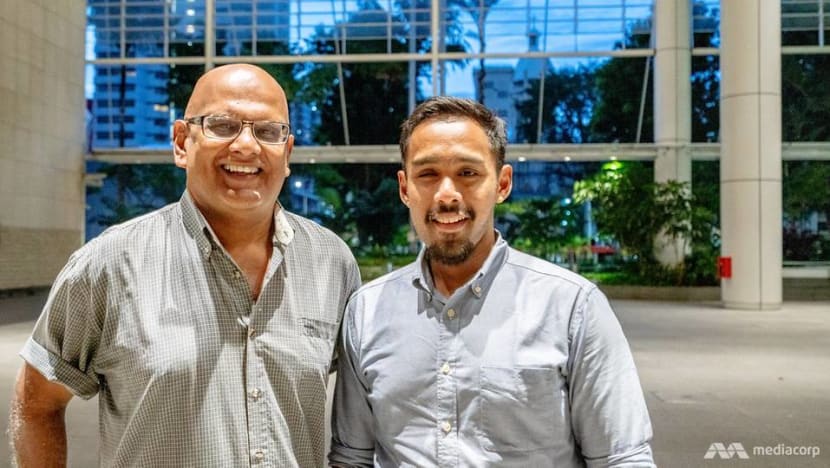
“Chemotherapy made me nauseous all the time,” said Mr Luqman, now a social studies and literature secondary school teacher. “I was puking to the extent I thought I couldn’t puke any more, but there were still things coming out of my mouth. Black bile.”
It wasn’t just the frequent feeling of wanting to retch. His sore throat was unimaginably bad, he said, and he lost most of his appetite.
Mr Mathiyan, who had to walk around with the skin between his legs raw from the radiotherapy, said the side effects from the cancer treatments are nothing “you would ever wish on your worst enemies”.
Friends and family tried to show their care and concern, said Mr Luqman, but he chose to withdraw instead. It didn’t help that he felt weak the whole time and he often had to skip school.
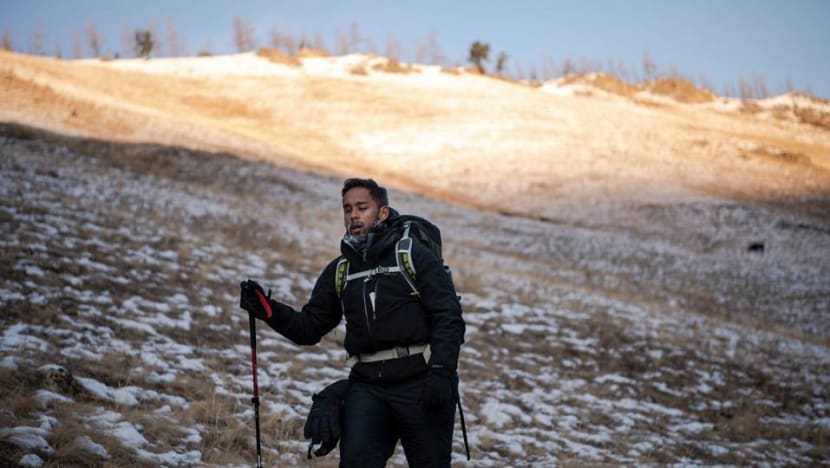
While his wife and friends were often ready with cups of tea or to accompany him for his chemotherapy session, it was his support groups – an online one from the UK and another at the Singapore General Hospital – that made him feel like his suffering was truly understood, said Mr Mathiyan.
Having gone through the agony of cancer with comfort from friends, family and fellow patients, Mr Luqman and Mr Mathiyan have both felt the need to return in kind by helping other cancer sufferers.
Besides raising funds for the Singapore Cancer Society through the 12-day winter expedition organised by travel agency Beyond Expeditions SG, both men wanted to inspire others like them to not feel battered by the pronouncement of a cancer diagnosis.
“A lot of people when they are diagnosed…they get very depressed. One of the motivations was to tell them there are still lots of things they can do,” said Mr Mathiyan, who is an avid swimmer, dragon-boater and Zumba dancer.
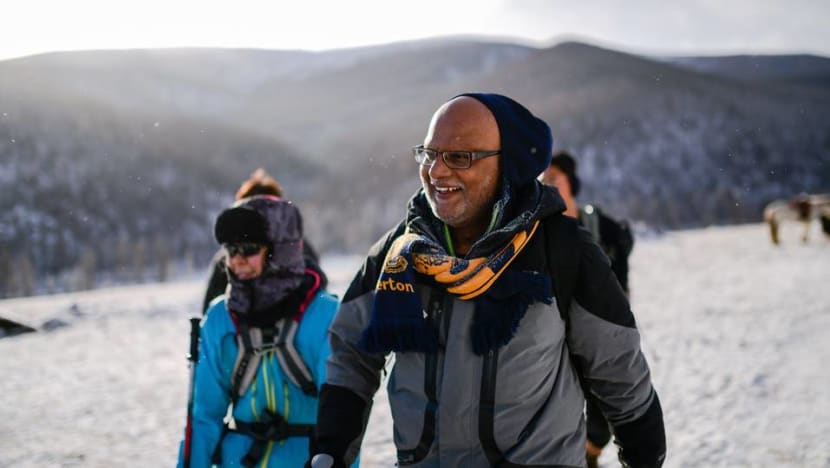
Apart from his overseas adventures – Mr Mathiyan had previously travelled in 2018 to the Gobi Desert for the same cause – the part-time administrative manager at a metal recycling company has his hands full with volunteer work. He is co-chair of the SingHealth Patient Advocacy Network, a founding member of the Ostomy Association of Singapore that looks into the needs of people with stoma bags, and patient ambassador with several hospitals.
READ: 'Every day I wake up is a bonus': The double cancer survivor set to trek the Gobi Desert
Unlike his older counterpart, this was Mr Luqman’s first time getting behind the cancer cause. It was an opportunity for him to share his journey with cancer and raise funds for patients that need financial assistance at the same time.
“I don’t see myself as an inspirational figure,” he said. “I think my takeaway from have the illness is to just survive. It may not take much but that (little bit of) resilience and perseverance can get you quite far.”
“Just staying alive and surviving is extraordinary in its own way.”
ONCE IN YOUR SHOES
Health advocacy groups CNA spoke to said having current and former clients participate in their advocacy work is invaluable as they are able to offer a personal and empathetic touch to the cause.
“They fully understand the pain, struggles and issues faced by cancer patients,” said a spokesperson from the Singapore Cancer Society, which runs five cancer support groups, among other programmes. “Sometimes, people want to know how other cancer survivor cope, especially after a major operation that would change their normalcy of life.”
READ: No cancer cells detected: First major step to recovery for British boy in Singapore for experimental treatment
Out of the 1,495 support group members, 90 cancer patients and survivors volunteer with the non-profit, where they provide psychosocial support for other cancer survivors, raise awareness about cancer and cancer prevention message, and help with the planning and publicity of events.
These volunteers give assurance to newly diagnosed patients that they are not alone in this battle, said the SCS spokesperson. For example, the oncologist might have the technical expertise to explain the process, outcome and impact of chemotherapy, but what matters to a cancer patient might be something as minor as physical appearance and hair loss.
“Having people to share tips and tricks on how to get around these sort of social challenges are tremendously helpful and often overlooked by doctors.”
A Singapore Heart Foundation (SHF) spokesperson said that clients who step forward to share their stories of cardiovascular diseases and recovery process help “paint a more realistic picture behind the statistics of the disease”, which is the leading cause of death in Singapore.
SHF, which serves 2,125 clients as of March 2019’s figures, has around 15 former and current heart disease patients who sought help from the organisation that now either donate to SHF or participate in their heart health campaigns annually, said the spokesperson.
READ: She couldn't help her dad - but now she's helping other dementia patients with tech
Some give talks so that the public can better understand people afflicted with cardiovascular diseases. Others have stepped forward to learn how to perform cardiopulmonary resuscitation (CPR) and use the automated external defibrillator (AED).
The Singapore Association for Mental Health (SAMH) said that it has observed an increasing trend of beneficiaries in recovery volunteering with the organisation. Volunteers help with peer-led sharing sessions, sports and arts activities.
Some have also opened up about their journey with a mental health condition at SAMH’s outreach events, which help to reduce misconceptions about mental illness as “the public can see that this person is as normal as others”.
MAKING IT LESS LONELY FOR THOSE WITH MENTAL HEALTH
One of SAMH’s volunteers who has made efforts to pay it forward is 37-year-old Dave Tan, who was showing signs of bipolar and mood disorders in his late-teens, after he was arrested for the second time for his public outbursts of anger and sent to hospital.
But following his last relapse about seven or eight years ago, Mr Tan has been in steady recovery and hasn’t been warded since. He currently works as a hotel steward, volunteers with Taoist temple Zhen Fu Tang, and took on an additional temporary job as group homes assistant with SAMH from March to June 2018.
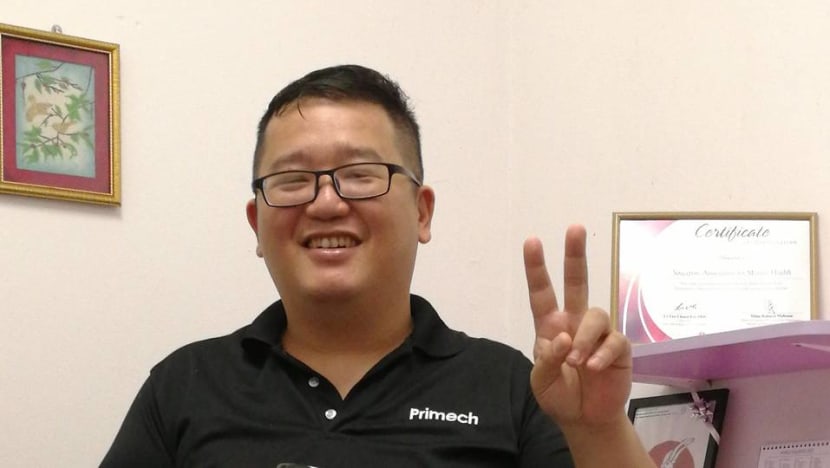
For almost two years now, Mr Tan has also been supporting SAMH by donating some of the temple’s funds to the charity, and organising block parties for the homes’ clients at the temple in Bukit Batok. The neighbourhood’s residents, SAMH staff and temple visitors also got to join in the fun.
These activities are his way of helping the homes’ clients feel less lonely during the holidays, he said, and serve as a platform for Singaporeans to interact with people with mental health conditions as his way of fighting the stigma of mental illness.
In his earlier years, having a mental health problem was much more taboo than today, Mr Tan said. And his frequent arrests and subsequent stays in hospital led to him being estranged from his family until his late-20s, he said.
It was the kindness of fellow patients-turned-friends that helped him to endure his time in the ward. They would offer him treats given to them by their visitors. These modest deeds - a cup of coffee, a packet of snacks, sometimes a word of advice - were indubitably cherished.
"These small gestures from other people in recovery gave me the urge to give back to the community," the normally jovial Mr Tan said, and it helps too, he added, "I like to spread to spread joy to people."














